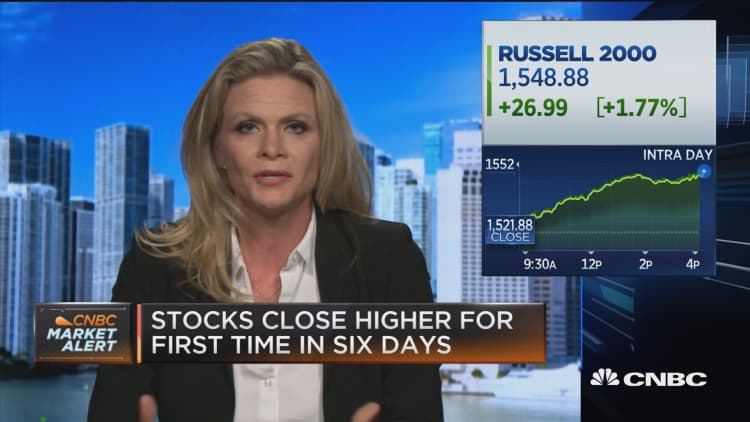
Stocks rose on Monday as strong gains in tech shares like Apple and Facebook offset a steep decline in Boeing.
The Dow Jones Industrial Average closed 200.64 points higher at 25,650.88 after falling more than 200 points. The gained 1.47 percent to end the day at 2,783.30, led by a 2.17 percent jump in the tech sector. The Nasdaq Composite advanced 2.02 percent to 7,558.06. The indexes also snapped a five-day losing streak.
Boeing fell 5.3 percent after a plane crash on Sunday that involved the 737 MAX 8 jet. This is the second crash in less than six months involving that model. Boeing's decline shaved off more than 150 points from the Dow given the index's price-weighted nature and the stock's high price relative to other Dow components.
However, Apple shares rose 3.47 percent — offsetting some Boeing's losses — after Bank of America Merrill Lynch upgraded the stock to buy from neutral. Bank of America noted the company's recent pullback presents "opportunity." The bank also raised its 12-month price target to $210 per share from $180.
Facebook gained 1.46 percent after Nomura Instinet upgraded it to buy from neutral. In a note to clients, analyst Mark Kelley said consumers are transitioning to Facebook's Stories format and its increased focus on messaging. Kelley also hiked his price target to $215 per share from $172.
Tech shares also got a boost after Nvidia announced it is buying Mellanox Technologies for $6.8 billion. Nvidia rose more than 6.97 percent while Mellanox surged 7.78 percent.
Monday's moves come after the major indexes posted their worst weekly performances of 2019 amid growing concerns of a possible economic slowdown around the world.
"The most recent economic data fits with our 2019 outlook that suggests economic growth is likely to slow this year but recession prospects remain very low," said Bruce Bittles, chief investment strategist at Baird, in a note. "This reinforces the view that the Federal Reserve will continue with patience with regards to any future rate hikes until such time that underlying economic fundamentals show significant improvement."
"As a result, the current weakness in the equity markets should be viewed within the confines of a consolidation phase," he said.
Data on Friday showed the world's largest economy added just 20,000 jobs in February versus an expected gain of 180,000 — marking the weakest month of jobs creation since September 2017.
Meanwhile, data out of China last week showed its exports slumped 20.7 percent from a year earlier, far below analysts' expectations and wiping out a surprise jump in January.
These figures all came less than 24 hours after the European Central Bank slashed its growth forecasts for the euro zone and announced a new round of policy stimulus.
On Sunday, Fed Chair Powell told "60 Minutes" that he thinks the U.S. economy is still strong, though he acknowledged that weakness around the world could start to hit the U.S. "I would say there's no reason why this economy cannot continue to expand."
In any case, investors should expect central banks across the world remain flexible and accommodative — which would be beneficial to stocks — said Brent Schutte, chief investment strategist for Northwestern Mutual Wealth Management.
"The Fed is listening to what it perceives the market's outlook to be. In past cycles, central banks would have looked through this recent time period in many cases. … The desire in central banks and fiscal authorities to have something even remotely close to what happened in 2007 is very light. That does have to frame any investor's outlook," he said.
—CNBC's Spriha Srivastava contributed to this report.


